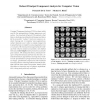Free Online Productivity Tools
i2Speak
i2Symbol
i2OCR
iTex2Img
iWeb2Print
iWeb2Shot
i2Type
iPdf2Split
iPdf2Merge
i2Bopomofo
i2Arabic
i2Style
i2Image
i2PDF
iLatex2Rtf
Sci2ools
ICCV
2001
IEEE
2001
IEEE
Robust Principal Component Analysis for Computer Vision
Principal Component Analysis (PCA) has been widely used for the representation of shape, appearance, and motion. One drawback of typical PCA methods is that they are least squares estimation techniques and hence fail to account for "outliers" which are common in realistic training sets. In computer vision applications, outliers typically occur within a sample (image) due to pixels that are corrupted by noise, alignment errors, or occlusion. We review previous approaches for making PCA robust to outliers and present a new method that uses an intra-sample outlier process to account for pixel outliers. We develop the theory of Robust Principal Component Analysis (RPCA) and describe a robust M-estimation algorithm for learning linear multivariate representations of high dimensional data such as images. Quantitative comparisons with traditional PCA and previous robust algorithms illustrate the benefits of RPCA when outliers are present. Details of the algorithm are described and ...
Computer Vision | ICCV 2001 | Pixel Outliers | Principal Component Analysis | Robust M-estimation Algorithm | Robust Principal Component | Typical Pca Methods |
Related Content
| Added | 15 Oct 2009 |
| Updated | 15 Oct 2009 |
| Type | Conference |
| Year | 2001 |
| Where | ICCV |
| Authors | Fernando De la Torre, Michael J. Black |
Comments (0)

